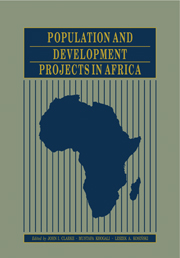Book contents
- Frontmatter
- Contents
- List of Tables
- List of Figures
- List of Contributors
- Preface
- 1 The demographic background to development in Africa
- 2 Development projects and their demographic impact
- 3 Conceptualization of the impacts of rural development projects upon population redistribution
- 4 Capitalism and the population landscape
- 5 Unequal participation of migrant labour in wage employment
- 6 Africa's displaced population: dependency or self-sufficiency?
- 7 Population redistribution and agricultural settlement schemes in Ethiopia, 1958–80
- 8 Populating Uganda's dry lands
- 9 Environmental and agricultural impacts of Tanzania's villagization programme
- 10 Development and population redistribution: measuring recent population redistribution in Tanzania
- 11 Communal villages and the distribution of the rural population in the People's Republic of Mozambique
- 12 A century of development measures and population redistribution along the Upper Zambezi
- 13 Resettlement and under-development in the Black ‘Homelands’ of South Africa
- 14 Development programmes and population redistribution in Nigeria
- 15 Population, disease and rural development programmes in the Upper East Region of Ghana
- 16 Demographic intermediation between development and population redistribution in Sudan
- 17 A typology of mobility transition in developing societies, with application to North and Central Sudan
- 18 Rural population and water supplies in the Sudan
- 19 The impact of the Kenana Project on population redistribution
- 20 Migrant labour in the New Halfa Scheme
- 21 The Gash Delta: labour organization in pastoral economy versus labour requirements in agricultural production
- 22 The impact of development projects on population redistribution to Gedaref Town in Eastern Sudan
- 23 The growth of Juba in Southern Sudan
- Index
9 - Environmental and agricultural impacts of Tanzania's villagization programme
Published online by Cambridge University Press: 05 November 2011
- Frontmatter
- Contents
- List of Tables
- List of Figures
- List of Contributors
- Preface
- 1 The demographic background to development in Africa
- 2 Development projects and their demographic impact
- 3 Conceptualization of the impacts of rural development projects upon population redistribution
- 4 Capitalism and the population landscape
- 5 Unequal participation of migrant labour in wage employment
- 6 Africa's displaced population: dependency or self-sufficiency?
- 7 Population redistribution and agricultural settlement schemes in Ethiopia, 1958–80
- 8 Populating Uganda's dry lands
- 9 Environmental and agricultural impacts of Tanzania's villagization programme
- 10 Development and population redistribution: measuring recent population redistribution in Tanzania
- 11 Communal villages and the distribution of the rural population in the People's Republic of Mozambique
- 12 A century of development measures and population redistribution along the Upper Zambezi
- 13 Resettlement and under-development in the Black ‘Homelands’ of South Africa
- 14 Development programmes and population redistribution in Nigeria
- 15 Population, disease and rural development programmes in the Upper East Region of Ghana
- 16 Demographic intermediation between development and population redistribution in Sudan
- 17 A typology of mobility transition in developing societies, with application to North and Central Sudan
- 18 Rural population and water supplies in the Sudan
- 19 The impact of the Kenana Project on population redistribution
- 20 Migrant labour in the New Halfa Scheme
- 21 The Gash Delta: labour organization in pastoral economy versus labour requirements in agricultural production
- 22 The impact of development projects on population redistribution to Gedaref Town in Eastern Sudan
- 23 The growth of Juba in Southern Sudan
- Index
Summary
A partial review is attempted of the development and under-development impacts of a massive population redistribution programme. Tanzania's villagization (sogeza) operations shifted over five million peasants from their former scattered homesteads into nucleated settlements of, in principle, 250–600 households each. The recent resettlement permanently altered the spatial, social and economic production relations of the peasantry as they were brought into approximately 8,000 vijijini vya maendeleo (development villages) and a new system of village government. In some quarters it has been praised as a model of socialist modernization, whereas in others it has been condemned as authoritarian state intervention in peasant relations of production.
After approximately one decade, villagization can be taken as established, but the relation between its original goals and the actual impacts requires critical examination. The focus in this paper is on the negative under-development impacts of the resettlement, both because these are already quite serious and could well be more so in the next decade, and because they are largely ignored in reviews of Tanzania's space economy and of the country's current economic crisis. Many problems can be ameliorated, though other negative impacts are unavoidable and justifiable. But certain basic changes must be implemented to reverse the environmental deterioration, the agricultural decline and a legacy of social discontent.
This is not a detailed study of particular aspects but a broad overview of problems and current solutions taken from contemporary studies. With 8,000 villages there are unavoidably some sweeping generalizations.
- Type
- Chapter
- Information
- Population and Development Projects in Africa , pp. 123 - 140Publisher: Cambridge University PressPrint publication year: 1985
- 5
- Cited by



